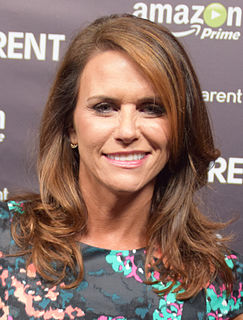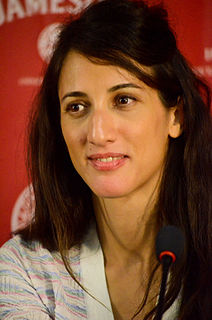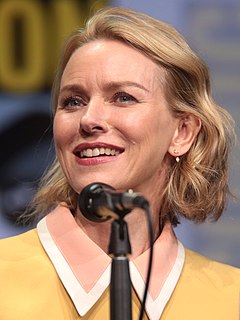A Quote by Lisa Jewell
Ever since 'Single White Female,' the 1990 novel which was turned into a supremely scary film, the idea of a seemingly normal woman who will stop at nothing to get what she wants has become an abiding literary trope.
Related Quotes
A man is commanding - a woman is demanding. A man is forceful - a woman is pushy. A man is uncompromising - a woman is a ball-breaker. A man is a perfectionist - a woman's a pain in the ass. He's assertive - she's aggressive. He strategizes - she manipulates. He shows leadership - she's controlling. He's committed - she's obsessed. He's persevering - she's relentless. He sticks to his guns - she's stubborn. If a man wants to get it right, he's looked up to and respected. If a woman wants to get it right, she's difficult and impossible.
I will always remember my delight when Mrs. Georgia Gilmore - an unlettered woman of unusual intelligence - told how an operator demanded that she get off the bus after paying her fare and board it again by the back door, and then drove away before she could get there. She turned to Judge Carter and said: "When they count the money, they do not know Negro money from white money.
I don't make movies. I don't feel that I have to have artistic control. Part of this comes from the fact that the book lives on no matter what Hollywood does to your novel in terms of a film. Now, you try to be careful who you allow to do your film because nobody wants their novel to become a turkey movie. But, on the other hand, it is a crapshot anyway, because even the best people can make a bad film.
Any advice I could give to female directors would be the same as for males: There will be endless difficulties, some seemingly defeating, on your way. That's a given. Just wipe out the very notion of stress. Concentrate on your actors. Obsess about your story and the world it is anchored in. Deal with the hundreds of down-to-earth issues [around] the existence of your film. At some point, everything will be ripe. And you wouldn't be able to stop your film from coming to life even if you wanted to.
The woman turned and went slowly into the house. As she passed the doors she turned and looked back. Grave and thoughtful was her glance, as she looked on the king with cool pity in here eyes. Very fair was her face, and her long hair was like a river of gold. Slender and tall she was in her white robe girt with silver; but strong she seemed and stern as steel, a daughter of kings.
When we first made this whole idea this was going to be calling card film [Moon] and it was going to give the opportunity to make my first feature film. But it turned out a lot better, we just couldn't stop ourselves from going into it, and we are very proud that it turned into something that people wanted to see.
'Gloria' is a film about a fifty eight-year-old woman who is quite alone in life; however, she is quite optimistic. Nobody has much time for her, and so she regularly goes to these single adults' parties where she is looking for someone. By the end of the film, she doesn't necessarily find love, but she does find something else.


































